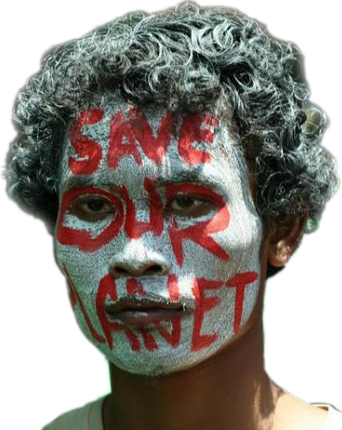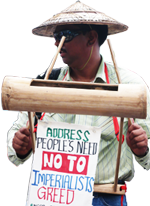PPCC's five-point platform for action
- Comprehensive and concerted but differentiated and equitable global effort to achieve deep, rapid, and sustained emissions reductions to stabilize CO2 concentrations at 350ppm and hold global average temperature rise to 1.5 degrees Celsius.
- Demand the reparation of Southern countries and the poor by Northern states, TNCs, and Northern-controlled institutions to redress historical injustices associated with climate change.
- Reject false solutions that allow Northern states and corporations to continue harming the environment and communities, provide new and greater opportunities for profit, and reinforce and expand corporate control over natural resources and technologies.
- Struggle for ecologically sustainable, socially just, pro-people, and long-lasting solutions.
- Strengthen the peoples' movement on climate change.
| TWN Panama News Update No.9 |
 |
 |
|
Led by India, a large number of developing countries had submitted a proposal for a decision on unilateral trade measures to be considered in Durban at the meeting of the Conference of Parties later this year. They wanted their submission to be the basis of negotiations in Panama but this was opposed by developed countries as well as Singapore, saying that discussions on this matter could be dealt with by the Subsidiary Bodies. In addition, they said that the UNFCCC was not the proper forum to deal with trade issues as this was in the competence of the WTO.
The G77 and China said that the Cancun decision provided the first path in addressing the concerns of developing countries on the impacts of response measures by developed countries to address climate change but further political guidance was needed from the COP to advance the Cancun decision and the mandate of the Bali Action Plan.
Developed countries disagreed with the developing countries that further work was needed by the AWG-LCA as they said that the Cancun decision had tasked the Subsidiary Bodies of the UNFCCC to provide a forum to address the impacts of response measures.
Argentina, speaking for the G77 and China said that the economic and social consequences of response measures is an issue that was important for developing countries and merits the full consideration by Parties of their concerns. The Cancun decision in this regard is the first path in addressing these concerns but there were further issues that must be addressed in line with the Bali Action Plan. It wanted the Panama meeting to resolve the political issues for the result that is needed in Durban, which include the establishment of the forum on response measures, assistance to developing countries affected by such measures and the trade issue. This is the package developing countries want to see in Durban, said Argentina, emphasizing the need for political direction to be given by the COP.
India said that one of the effects of response measures is on international trade. It referred to a submission by a large number of like-minded countries on this and said that the submission should be treated as a negotiating text for further discussions, which was supported by other developing countries including China, Saudi Arabia and Venezuela).
(The submission referred to by India on trade and climate change was submitted as a Conference Room Paper and had the support of Argentina, China, the African Group, the OPEC countries, the Arab Group, Thailand, Malaysia, Uruguay and the Philippines. The proposal by these countries was for a decision to be adopted that “developed country Parties shall not resort to any form of unilateral measures, including tariff, non-tariff, and other fiscal and non-fiscal border trade measures, against goods and services from developing country Parties on any grounds related to climate change, including protection and stabilization of climate, emissions leakage and cost/or cost of environment compliance; recalling the principles and provisions of the Convention, in particular Article 4, paragraphs 1,4 and 5, Article 4, paragraphs 3,5 and 7, and taking into account the principles of equity, common but differentiated responsibilities and respective capabilities and the obligations of the developed country Parties to provide financial resource, transfer technology and provide capacity building support to the developing country Parties).
Australia did not support the Indian proposal saying that it was unusual for Parties to base texts on the CRP document.
In response to the G77 and China and India, the European Union said that it was not unwilling to discuss the range of issues raised but said that in Cancun, Parties had agree to settle the addressing of these issues under the Subsidiary Bodies and it had trouble understanding what further work was needed under the AWG-LCA. In terms of substance, it had difficulty in seeing issues such as trade that belong to the WTO be discussed under the UNFCCC as this went beyond the Convention’s competence.
The United States made similar comments as the EU and said that the Subsidiary Bodies had been given tasks through workshops, which have been held on response measures, and it was not the time yet to discuss the Indian CRP document. It did not understand what developing countries wanted the AWG-LCA to do further.
In response, Argentina, speaking for the G77 and China said that the national communications of developed countries were incomplete as they did not report on the consequences of response measures on developing countries, giving the example of the European Union’s Emissions Trading Scheme that had no assessment of the implications and impacts on developing countries. That is why there was need for an institutional forum to discuss such issues. The Cancun decision provided the first step but it asked how this decision was going to be implemented to avoid the impacts and that needed concrete political guidance. There was need for a structured approach on how to avoid the negative consequences, it added.
Argentina (speaking for itself) said that the WTO was not negotiating climate change and trade and it was aware that the WTO was waiting for a signal from the UNFCCC in relation the interpretation regarding trade and climate change. It said that developing countries were not challenging the WTO rules but the issue is related to climate change and the proper forum for that is the UNFCCC. It stressed the need for the UNFCCC to send signals to the WTO and give the political guidance on the issue of trade measures related to climate change.
India supported Argentina and said that the submission provided was based on principles and guidelines under the Convention and hence there was need for guidance from the UNFCCC COP on this issue.
South Africa supported Argentina and said that national communications were inadequate in addressing the consequences of response measures and there was need for direct exchange of views in a public space and stressed the need for the establishment of the forum for this.
In response to South Africa, the US asked what the difference was in this (AWG-LCA) forum and what the forum under the Subsidiary Bodies. It said that it could not understand why the Subsidiary Bodies in developing the work programme could not discuss these issues.
The European Union echoed the sentiments of the US and failed to see how a forum under the Subsidiary Bodies could not address the issues raised. It said that it failed to understand the procedural game as the process (under the Subsidiary Bodies) was set up in Cancun.
Argentina in response stressed that Parties had a mandate under the Bali Action Plan to discuss these issues and it was also part of the agenda agreed to in Bangkok. It said that the Subsidiary Bodies had several tasks but what was needed here (under the AWG-LCA) was to discuss the political parameters and how to improve the existing channels such as the national communications and how developed countries were going to assist developing countries in addressing the impacts. The AWG-LCA was the space to define the political parameters, said Argentina. China, Saudi Arabia and Venezuela supported Argentina in this regard.
Despite these clarifications, Canada, Australia, New Zealand, the US and the EU all said that they could not understand the need for the AWG-LCA to be discussing these matters when the Subsidiary Bodies were tasked to deal with the issues. New Zealand said that on the trade issue, there was no evidence yet that this was a problem and therefore, it was too premature for this matter to be considered.
Singapore also shared the views of the developed countries and said that the proper forum to discuss the trade issue was the WTO and not the UNFCCC.
Saudi Arabia said that in Bangkok, Parties had agreed to the AWG-LCA agenda, recognizing that additional work needed to be done under the working group and that the Chair of the AWG-LCA hoped to see negotiating texts from Panama for Durban. It said that in all informal groups, negotiating texts were being prepared and it did not mean that Parties have agreed to the text but what was needed was a paper that reflected the divergent views of Parties as a starting point.
Given the divergence of views on the matter, the co-facilitator proposed further discussions on how to move forward
Like it? Share it!
| Thursday, 06 October 2011 13:10 |
|
Developing countries’ proposal on unilateral trade
measures draws strong opposition
Panama City, 4 October (Meena Raman) – A submission by a large group of developing countries to address unilateral trade measures was strongly opposed by developed countries as well as developing countries like Singapore at climate negotiations taking place in Panama City under the United Nations Framework Convention on Climate Change (UNFCCC).
The issue arose at the first meeting of the Parties in an informal group on ‘economic and social consequences of response measures’ under the Ad-hoc Working Group on Long-term Cooperative Action (AWG-LCA), which met on 3 October and was facilitated by Mr. Crispin d’Auvergne of St. Lucia.
|
| < Prev |
|
Next > |
 The Peoples' Movement on Climate Change (PMCC) seeks to advance the People's Protocol on Climate Change as the Southern peoples' strategy and response to the climate change issue.
The Peoples' Movement on Climate Change (PMCC) seeks to advance the People's Protocol on Climate Change as the Southern peoples' strategy and response to the climate change issue.




